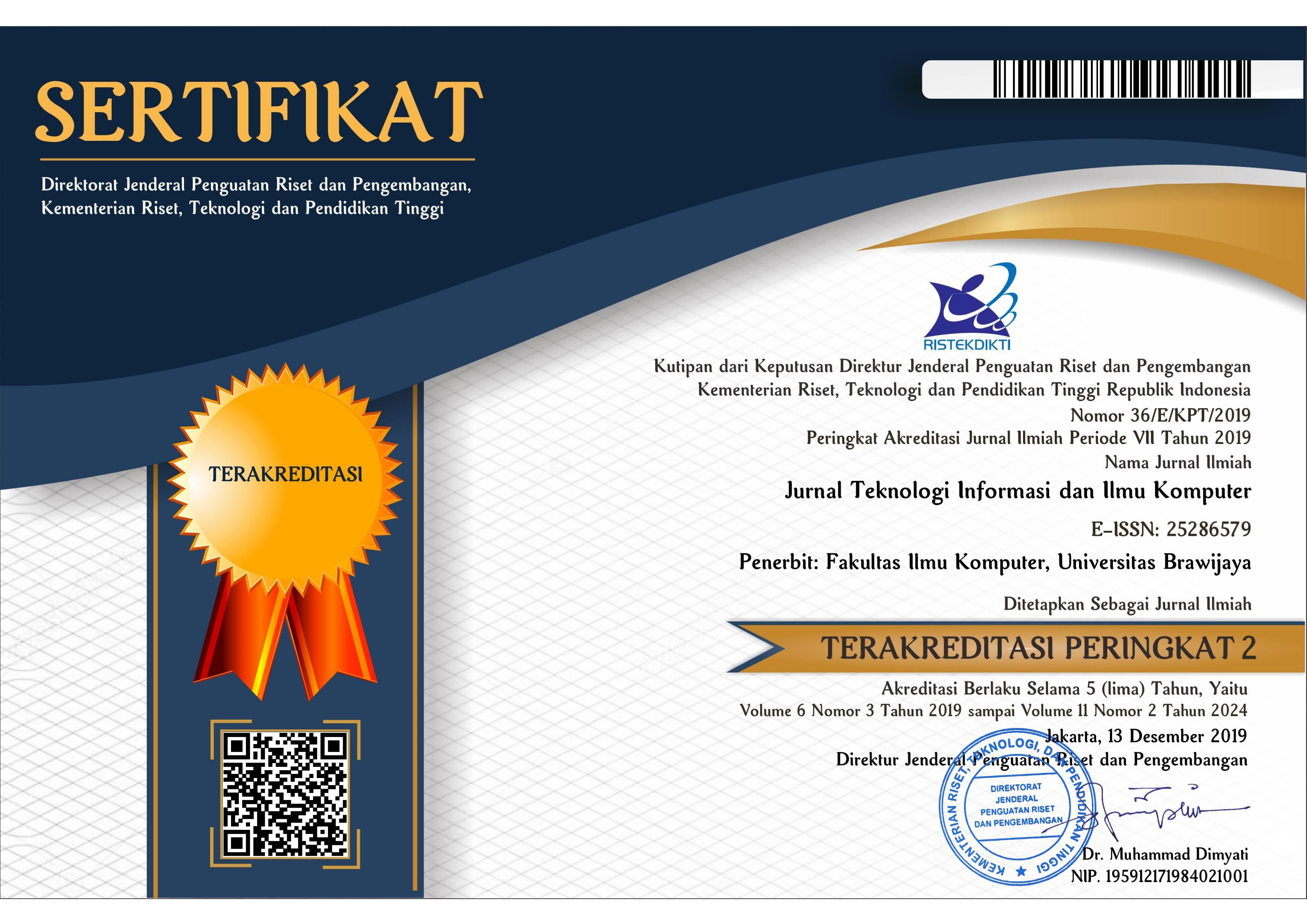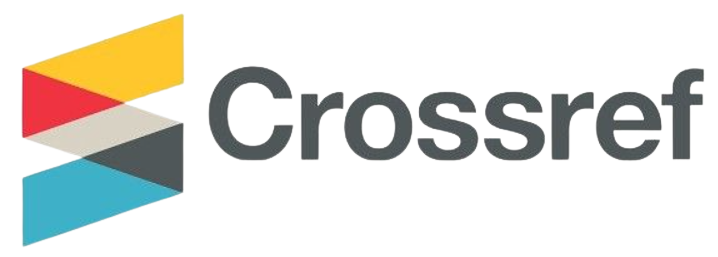Analisis Klasifikasi Sentimen Ulasan pada E-Commerce Shopee Berbasis Word Cloud dengan Metode Naive Bayes dan K-Nearest Neighbor
DOI:
https://doi.org/10.25126/jtiik.2022924960Abstrak
Saat ini internet memungkinkan pengguna untuk membuat ulasan secara online diberbagai jenis platform. Salah satunya aplikasi e-commerce Shopee pada website google play store dimana kelas sentimen positif dan negatif yang terdapat pada ulasan online jelas mencerminkan persepsi pengguna tentang berbagai jenis layanan dan produk yang ada. Selain itu, pelanggan berpotensial yang membaca ulasan online dapat secara signifikan terpengaruh oleh sentimen dari ulasan yang tertera pada kolom ulasan. Hal ini menandakan ulasan yang bersentimen positif ataupun negatif yang ditinggalkan oleh pengguna sangat mempengaruhi pengguna lainnya dalam memilih layanan maupun produk yang dicari. Oleh karena itu perlunya analisis sentimen untuk mengklasifikasi dataset yang begitu banyak sehingga dapat dengan mudah mengetahui apa saja sentimen pelanggan. penelitian ini menggunakan data ulasan sebanyak 500 ulasan . Kemudian ulasan tersebut diklasifikasi menggunakan aplikasi orange dengan metode Naïve Bayes dan K-Nearest Neighbor (KNN). Kemudian selanjutnya menggunakan metode word cloud untuk mengetahui topik-topik yang sering diulas oleh pelanggan. Hasilnya setelah menggunakan metode Naive Bayes memperoleh hasil nilai accuracy 0,914, precision 0,915, recall 0,914 dan F1 score 0,916. Sedangkan metode KNN memperoleh nilai accuracy 0,928, precision 0,929, recall 0,928, dan F1 score 0,926. Hal ini membuktikan bahwa dalam penelitian ini kinerja metode KNN lebih baik. Kemudian berdasarkan hasil word cloud yang diperoleh didapatkan informasi kata dengan sentimen positif yang paling sering diulas oleh pelanggan diantaranya terkait kata: gratis, bagus, suka, murah, mudah, dan cepat. Sedangkan informasi sentimen negatif yang diperoleh seperti kata : kecewa, jelek, mahal, bohong, ribet, dan perbaiki.
Abstract
Today the internet allows users to create online reviews on various types of platforms. One of them is the Shopee e-commerce application on the google play store website, where the positive and negative sentiment classes contained in online reviews reflect user perceptions about the various types of services and products available. Also besides, potential customers who read online reviews can be significantly affected by the sentiment of the reviews listed in the review column. This indicates that positive or negative reviews left by users greatly influence other users in choosing the services or products they are looking for. Therefore the need for sentiment analysis to classify such a large dataset so that you can easily find out what customer sentiments are. This study uses a dataset of 500 reviews. Then the reviews are classified using the orange application with the Naïve Bayes and K-Nearest Neighbor (KNN) methods. Then use the word cloud method to find out topics that are frequently reviewed by customers. The results, after using the Naïve Bayes method, get the accuracy value of 0.914, precision 0.915, recall 0.914, and F1 score 0.916. Meanwhile, the KNN method obtained an accuracy value of 0.928, precision 0.929, recall 0.928, and F1 score 0.926. This proves that in this study the performance of the KNN method is better. Then based on the word cloud results obtained word information with positive sentiments that are most often shared by customers related to words: free, good, like, cheap, easy, and fast. Meanwhile, the negative sentiment information obtained includes the words: disappointed, ugly, expensive, lying, complicated, and fix.
Downloads
Referensi
ALAMSYAH, ANDRY, & FAISHAL NURUZ ZUHRI. 2017. “Measuring Public Sentiment Towards Services Level in Online Forum Using Naive Bayes Classifier and Word Cloud.” CRS-ForMIND International Conference and Workshop 2017 (October).
ARTANTI, DIAN PUTRI, ABDUL SYUKUR, ADI PRIHANDONO, & DE ROSAL I MOSES SETIADI. 2018. “Analisa Sentimen Untuk Penilaian Pelayanan Situs Belanja Online Menggunakan Algoritma Naïve Bayes.” : 8–9.
AZZAHRA, SITTI ALIYAH, & ARIEF WIBOWO. 2020. “Analisis Sentimen Multi-Aspek Berbasis Konversi Ikon Emosi Dengan Algoritme Naïve Bayes Untuk Ulasan Wisata Kuliner Pada Web Tripadvisor.” Jurnal Teknologi Informasi dan Ilmu Komputer 7(4): 737.
DWI, HADYA JAYANI. 2020. “Pengunjung Situs Shopee Terbesar Di Indonesia.” 6 Juli (April):
MASRIPAH, SITI, & LILA DINI UTAMI. 2020. “Algoritma Klasifikasi Naïve Bayes Untuk Analisa Sentimen Aplikasi Shopee.” Swabumi 8(2): 114–17.
MUKTAFIN, ELIK HARI, KUSRINI KUSRINI, & EMHA TAUFIQ LUTHFI. 2020. “Analisis Sentimen Pada Ulasan Pembelian Produk Di Marketplace Shopee Menggunakan Pendekatan Natural Language Processing.” Jurnal Eksplora Informatika 10(1): 32–42.
PULAKIANG, ANTHONI RIVAI ;I MADE NOMO WIRATHA; JOHN REIMON BATMETAN. 2019. “Analisis Kualitas Layanan E-Commerce Menggunakan Twitter.” Indonesian Jpurnal on Information System 4(April): 25–31.
RATNAWATI, FAJAR. 2018. “Implementasi Algoritma Naive Bayes Terhadap Analisis Sentimen Opini Film Pada Twitter.” INOVTEK Polbeng - Seri Informatika 3(1): 50.
SALAM, ABU, JUNTA ZENIARJA, & RIMA SEPTIYAN USWATUN KHASANAH. 2018. “Analisis Sentimen Data Komentar Sosial Media Facebook Dengan K-Nearest Neighbor (Studi Kasus Pada Akun Jasa Ekspedisi Barang J&T Ekpress Indonesia).” Prosiding SINTAK: 480–86.
SEPTIAN, JEREMY ANDRE, TRESNA MAULANA FAHRUDIN, & ARYO NUGROHO. 2019. “Analisis Sentimen Pengguna Twitter Terhadap Polemik Persepakbolaan Indonesia Menggunakan Pembobotan TF - IDF Dan K - Nearest Neighbor.” Journal of Intelligent Systems and Computation (September): 43–49.
UTAMI, LILYANI ASRI. 2017. “Melalui Komparasi Algoritma Support Vector Machine Dan K-Nearest Neighbor Berbasis Particle Swarm Optimization.” 13(1): 103–12.
VIJAYARAGAVAN, P., R. PONNUSAMY, & M. ARAMUDHAN. 2020. “An Optimal Support Vector Machine Based Classification Model for Sentimental Analysis of Online Product Reviews.” Future Generation Computer Systems 111: 234–40.
https://doi.org/10.1016/j.future.2020.04.046.
WU, BING, & PENG LI. 2020. “Influence of MOOCs EWOM on the Number of Registrations and Completions.” IEEE Access 8: 158826–38.
Unduhan
Diterbitkan
Terbitan
Bagian
Lisensi

Artikel ini berlisensi Creative Common Attribution-ShareAlike 4.0 International (CC BY-SA 4.0)
Penulis yang menerbitkan di jurnal ini menyetujui ketentuan berikut:
- Penulis menyimpan hak cipta dan memberikan jurnal hak penerbitan pertama naskah secara simultan dengan lisensi di bawah Creative Common Attribution-ShareAlike 4.0 International (CC BY-SA 4.0) yang mengizinkan orang lain untuk berbagi pekerjaan dengan sebuah pernyataan kepenulisan pekerjaan dan penerbitan awal di jurnal ini.
- Penulis bisa memasukkan ke dalam penyusunan kontraktual tambahan terpisah untuk distribusi non ekslusif versi kaya terbitan jurnal (contoh: mempostingnya ke repositori institusional atau menerbitkannya dalam sebuah buku), dengan pengakuan penerbitan awalnya di jurnal ini.
- Penulis diizinkan dan didorong untuk mem-posting karya mereka online (contoh: di repositori institusional atau di website mereka) sebelum dan selama proses penyerahan, karena dapat mengarahkan ke pertukaran produktif, seperti halnya sitiran yang lebih awal dan lebih hebat dari karya yang diterbitkan. (Lihat Efek Akses Terbuka).















